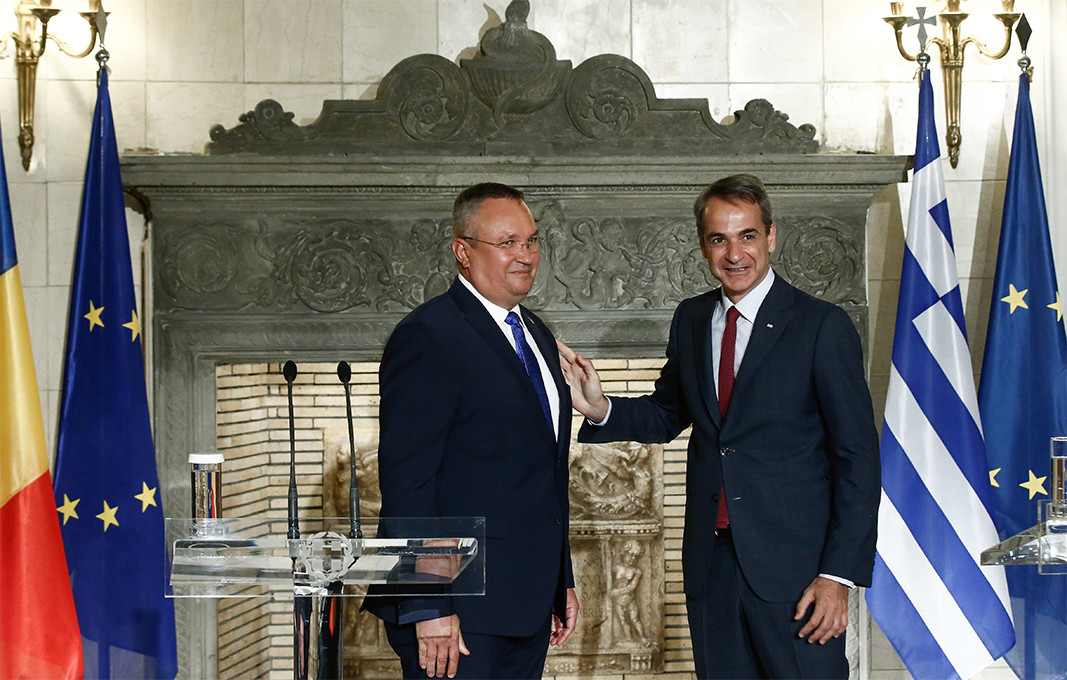Protests in North Macedonia against so-called French offer continue

The violent protests in Skopje against the so-called French proposal for the launch of EU accession negotiations with North Macedonia, that have led to violent clashes and injuries are not subsiding. They are supported by the biggest opposition party VMRO-DPMNE and the pro-Russian Left. The government discussed the offer at a closed sitting and will send it for consideration by parliament. Asked whether the MPs from VMRO-DPMNE will approve the proposal, the party’s leader Hristijan Mickoski that “there are no traitors among the current members of VMRO-DPMNE and the coalition”. According to Deputy PM Artan Grubi, the riots in Skopje are instigated by foreign agents, and Russia’s long arm.
The French offer aims to put an end to the disputes between Bulgaria and North Macedonia, and pave the way to negotiations between Skopje and the EU. The framework stipulates that observance of the 2017 goodneighbour agreement between Bulgaria and North Macedonia is part of the accession commitments. According to the proposal, Skopje must also guarantee it will include Bulgarians in the Constitution of North Macedonia “where other peoples are mentioned, on a par with these peoples”, and that nothing in the process of North Macedonia’s European integration can be interpreted as recognition, by the Bulgarian side, of the existence of a “Macedonian language”.
Croatia could join Schengen ahead of Bulgaria and Romania

Croatia meets all requirements for entry into Schengen, and we shall do everything we can to help its admission next year, Czech Prime Minister Petr Fiala said after a meeting with his Croatian counterpart Andrej Plenković. On 1 July, Croatia assumed the Presidency of the Council of the EU. According to PM Fiala, Croatia’s candidacy has strong support within the 27-member travel-free bloc, but as regards Bulgaria and Romania, some members of the EU have their reservations, BGNES reports. Andrej Plenković stated that his country had received a European Commission report on its progress towards Schengen which says that Croatia has done what was expected of it in all eight areas. Bulgaria and Romania have been members of the EU since 2007, Croatia – since 2013.
Record high annual inflation in Turkey for June

The annual inflation in Turkey reached 78.62% in June, the Turkish Statistical Institute has announced. According to Karar newspaper, this is the highest inflation rate in Turkey since 1998. The price rise is steepest in transport – 123.37% and with food and soft drinks – 93.93%. Critics are blaming President Recep Erdogan’s economic policy for the problems Turkey is facing, the newspaper writes. The situation in Turkey is complicated further by the war in Ukraine which has pushed up the prices of gas, oil and grain. The data of the Turkish Statistical Institute are contested by economists who say that the statistics are subject to political pressure. According to the inflation research group of independent economists, the real level of annual inflation in Turkey in June is 175.55%.
Russia is the biggest investor in Montenegro

Russia was Montenegro’s biggest investor during the first four months of the year, with EUR 41.6 million of direct investments, EUR 20 million of which was invested in real estate, the Bulgarian news agency BTA reports. Second and third come the United Arab Emirates and Turkey. Ukrainians have spent EUR 4.6 million on real estate in Montenegro, investments from Germany are also up. In the period from 1 February to 9 June, 2022, Russian citizens have set up 11,000 companies in Montenegro, most of them in IT.
According to data of the central bank of Montenegro, during the same period, foreign investments in the country amounted to EUR 306.4 million, which is EUR 68.4 million more than during the same period of 2021.
Greece-Bulgaria gas interconnector is crucial for Europe

Greece is going to become a centre for the storage and transmission of natural gas which will cover its own national needs but also the needs of the countries of the region, Greece’s Prime Minister Kyriakos Mitsotakis said at a press conference with his Romanian counterpart Nicolae Ciucă, AGERPRES reports. The Romanian prime minister is paying a visit to Greece for the commissioning of the Greece-Bulgaria gas interconnector. Nicolae Ciucă stated that this gas connection is crucial for the entire gas transmission network in Europe, and that it will connect the network passing across Anatolia and the Adriatic and will ensure the gas deliveries to Bulgaria and Romania, and, possibly to Ukraine, Moldova and other countries.
Compiled by Miglena Ivanova
Photos: EPA/BGNES, Reuters, ee24.comThe Museum of the Bulgarian National Revival in Varna presents a collection of 15 authentic folk costumes from the collection of the Historical Museum in the town of Popovo. The valuable costumes are from the regions of Elhovo,..
Deanna Haag was born in Cleveland, Ohio, USA. She grew up dreaming of adventure and new horizons. After graduating from Wittenberg College in Ohio with a degree in Fine Arts, her life took an unexpected turn. The young American stood out for her..
Support for the activities of the Institute of Social Activities and Practices in Sofia is the cause that will unite organizers and guests of the Viennese Ball, which has become a tradition for the Bulgarian capital. This year's edition, scheduled..

+359 2 9336 661
